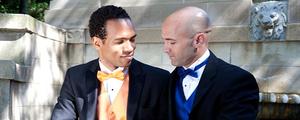Story Highlights
- LGBT identification up among Black, White and Hispanic adults
- More Hispanic adults than White, Black adults identify as LGBT
- Higher Hispanic LGBT proportion due to the population's relative youth
WASHINGTON, D.C. -- The growth in the U.S. LGBT population that Gallup reported earlier this year is reflected across the nation's largest U.S. racial and ethnic groups. Non-Hispanic Black, Non-Hispanic White, and Hispanic adults in the U.S. are all more likely today to identify as lesbian, gay, bisexual, transgender or something other than heterosexual than they were in 2012, when Gallup began measuring LGBT identification.
The growth has been greater among Hispanic adults than among White or Black adults, with Hispanic LGBT identification surpassing 8% in 2020 and reaching double digits in 2021. By contrast, just over 6% of White and Black adults identify as LGBT in the latest estimates.
These results are derived from Gallup's latest update on LGBT identification, reported in February and based on combined data from more than 12,000 telephone interviews conducted in 2021 with U.S. adults aged 18 and over. These include interviews with more than 1,000 Black and Hispanic Americans each.
The driving factor in increasing U.S. LGBT identification is the greater tendency for younger adults -- millennials and, particularly, adult members of Generation Z -- to identify as something other than heterosexual. Roughly one in five adults in Generation Z (those born between 1997 and 2003) and one in 10 millennials (those born between 1981 and 1996) identify as LGBT, compared with fewer than one in 20 in older generations.
Greater LGBT identification among Hispanic adults appears to be primarily a function of the younger overall age of the Hispanic population compared with the Black and especially the White populations in the U.S. Hispanic adults are much more likely to be members of Generation Z or the millennial generation than White or Black adults are.
An analysis of combined 2020 and 2021 data underscores that racial and ethnic differences in LGBT identification are primarily related to age rather than race or ethnicity. Specifically, Gallup finds younger White Americans (15.5%) are just as likely as younger Hispanic Americans (15.5%) to identify as LGBT, with younger Black Americans slightly lower (12.1%).
Less than 6% in all older age groups of Hispanic, Black and White Americans consider themselves lesbian, gay, bisexual or transgender. Hispanic Americans in older age groups are about as likely as Black and White Americans in the same age categories to identify as LGBT.
While Gallup has a sufficiently large sample of Asian American adults to report LGBT estimates, the sample is of English-speaking Asian adults only. Gallup conducts its telephone interviews in English or Spanish. With an estimated one in four Asian adults not speaking English, and English proficiency much more common among younger (likely U.S.-born) than older (likely immigrant) Asian Americans, a reliable estimate of the Asian American LGBT population cannot be reported with these data.
Additionally, Gallup does not have sufficiently large sample sizes of Native American and Native Hawaiian or Pacific Islander populations to report reliable estimates of LGBT identification among these subgroups.
Bottom Line
Increased LGBT identification in the U.S. is being led by younger generations, and young adults of all racial and ethnic backgrounds are much more likely than older Americans to think of themselves as being something other than heterosexual. Because the Hispanic American population tends to be much younger than their White and Black American counterparts, LGBT identification is more common among the Hispanic subgroup overall.
These data shed light not only on Americans' changing views of their sexual orientations or gender identities, but also how those relate to, and are driven by, changes in the composition of the U.S. adult population more generally.
To stay up to date with the latest Gallup News insights and updates, follow us on Twitter.
Learn more about how the Gallup Poll Social Series works.




